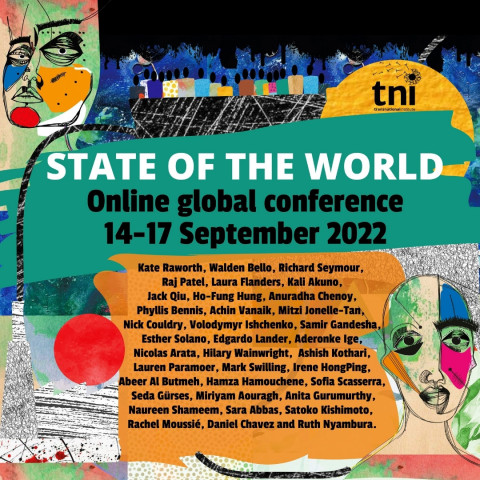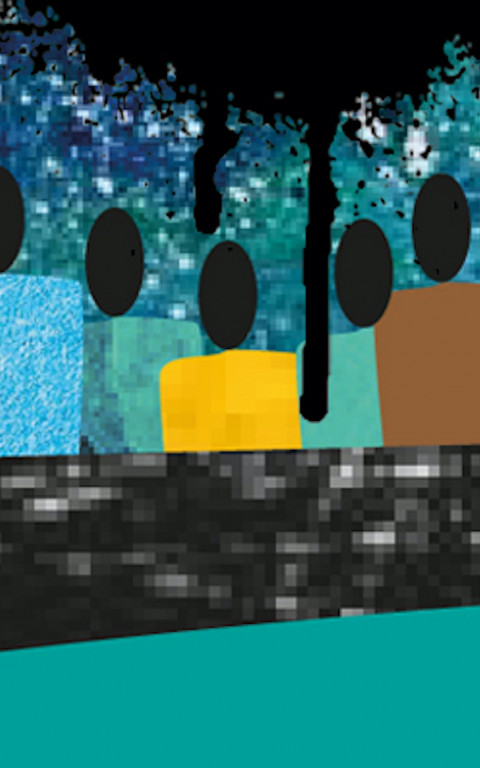Estado del mundo 2022 Conferencia virtual
Regiones
Our world is in a state of flux and crisis. The pandemic exposed the deep injustice of our economic and social system. Yet more than 2 years on, the health crisis continues, compounded by spiralling food and energy prices, escalating wars and ever more signs of environmental collapse. How can progressive forces better understand these dynamics and improve our strategies to achieve system change? Sign up to hear some of the best scholar activists worldwide with a truly internationalist analysis of the state of the world.

Get a ticket
Times of sessions
Speakers
Programme
Languages
Partners
Get a ticket
Click here to get your ticket for the sessions. To make the conference accessible for as many people as possible we have a sliding scale pricing structure; based on capacity to pay. One ticket gives you access to all sessions.
A time for everyone
There are two sessions each day for four days, for a total of 4 hours.
As a global conference, it is impossible to get a time that works for everyone. But we have tried our best to offer sessions that will work best for the Western hemisphere and others for the Eastern hemisphere. All participants will receive recordings of the sessions they missed.
Speakers
Kate Raworth, Walden Bello, Richard Seymour, Raj Patel, Laura Flanders, Kali Akuno
Volodymyr Ishchenko, Ho-Fung Hung, Anuradha Chenoy, Phyllis Bennis, Achin Vanaik, Mitzi Jonelle-Tan, Nick Couldry, Jack Qiu, Samir Gandesha, Esther Solano, Edgardo Lander, Aderonke Ige, Nicolas Arata, Hilary Wainwright
Ashish Kothari, Lauren Paramoer, Mark Swilling, Irene HongPing, Abeer Al Butmeh, Hamza Hamouchene, Anita Gurumurthy, Miriyam Aouragh, Seda Gürses, Sofia Scasserra, Naureen Shameem, Sara Abbas, Satoko Kishimoto, Rachel Moussié, Daniel Chavez
Programme
All times are Central European Standard Time (CET)
Programme is subject to change
Wednesday 14 September
14:00-16:00
Session 1: A world in crisis : Internationalist perspectives
Richard Seymour, Walden Bello
Moderator: Fiona Dove
COVID-19 showed the fundamental flaws of neoliberal economics in dealing with a public health emergency and the scope for state interventions for the common good. But what is left two years on? What is the economic and political fallout of the pandemic? Is there any prospect of marshalling the response we need to the unfolding climate crisis? Where are the opportunities for forging alternatives to neoliberal globalisation?
17:00-19:00
Session 2: Ukraine, Imperialisms and a new International Order
Volodymyr Ishchenko, Ho-Fung Hung, Anuradha Chenoy, Phyllis Bennis
Moderator: Arun Kundnani
What are the long-term implications of the war on Ukraine less than a year after US withdrawal from Afghanistan? Does it mark the beginning of a new era of inter-imperial rivalries? What are the key strategic goals for today’s great powers? Which regions will be the focus of future conflicts? What challenges and opportunities does this pose to progressive forces?
Thursday 15 September
11:00-13:00
Session 3: Building a new economy in the wake of wars and the pandemic
Kate Raworth, Raj Patel, Ashish Kothari, Lauren Paramoer
Moderator: Laura Flanders
The pandemic should have been a turning point towards a new economy centered around essential workers and essential needs. Instead it has sparked speculative profiteering, a surge in prices for essential goods, the revival of an austerity economics and a disturbing growth in poverty and precarity. What changes are needed to bring back control over food and essential services, to put care rather than greed at the centre of our economy and to protect rather than destroy our environmental life-systems?
17:00-19:00
Session 4: Repower – Remaking our energy system to confront climate injustice
Mark Swilling, Irene HongPing, Abeer Al Butmeh, Hamza Hamouchene
To tackle the climate crisis and now a cost-of-living crisis, we need to urgently remake our energy system. How can we democratise and green our energy system by 2030? How can we ensure a renewable energy system doesn’t replicate the extractive and colonial systems embedded in the fossil fuel energy system? What policies are needed and what are the biggest challenges we must overcome?
Friday 16 September
11:00-13:00
Session 5: Digital capitalism: the new frontier
Anita Gurumurthy, Miriyam Aouragh, Seda Gürses, Nick Couldry, Jack Qiu
Moderator: Sofia Scasserra
We are experiencing a time of accelerated technological change, a new industrial revolution, led by giant corporations in the marketplace and by security states in terms of surveillance. How is digitalisation changing capitalism or entrenching it? Why is its infrastructure so colonial? How will the expansion of the digital frontier shape geopolitics and resource conflicts? How do we forge a different path?
17:00-19:00
Session 6: Democracy undone: Confronting the forces of reactionary authoritarianism and corporate-captured politics
Samir Gandesha, Achin Vanaik, Esther Solano, Naureen Shameem
Moderator: Edgardo Lander
In many regions, democracy is absent or in retreat, hijacked by reactionary authoritarian populists, or stagnating as look-alike corporate-captured parties fail to offer solutions to the crises we face. Much of the world remains controlled by clientelistic or authoritarian goverments. What are the underlying causes of the rise of authoritarianism or corporate-captured politics? How can we push for a participatory political and economic democracy that can revitalise people power?
Saturday 17 September
14:00-16:00
Session 7: State of the Movements – turning protest to power
Kali Akuno, Sara Abbas, Mitzi Jonelle-Tan, Ruth Nyambura
Moderator: Hilary Wainwright
Twenty years ago, social movements were described by the New York Times as the world’s second superpower. What is the situation today? What victories have been won and what are our biggest challenges? Who are the emerging social movement actors and what capacity do they have to shift power in today’s global economy? What can we learn from the strategies and tactics deployed by movements? How can we turn protest into power and rhetoric into real systemic change?
17:00-19:00
Session 8: The Future is Public
Satoko Kishimoto, Rachel Moussié, Aderonke Ige, Nicolás Arata
Moderator: Daniel Chavez
The world we want is already here. Worldwide, communities and states are putting into practice policies and practices that we need to address the systemic crises. Where are the most encouraging models for transformation globally? What are the conditions for their success and sustainability? What can we learn from their successes and failures? How can they be scaled up to national or global level?
Languages
The conference will be held with simultaneous interpretation in both English and Spanish.
Partners
Programme
14:00-16:00
Session 1: A world in crisis : Internationalist perspectives
Richard Seymour, Walden Bello
Moderator: Fiona Dove
COVID-19 showed the fundamental flaws of neoliberal economics in dealing with a public health emergency and the scope for state interventions for the common good. But what is left two years on? What is the economic and political fallout of the pandemic? Is there any prospect of marshalling the response we need to the unfolding climate crisis? Where are the opportunities for forging alternatives to neoliberal globalisation?
17:00-19:00
Session 2: Ukraine, Imperialisms and a new International Order
Volodymyr Ishchenko, Ho-Fung Hung, Anuradha Chenoy, Phyllis Bennis
Moderator: Arun Kundnani
What are the long-term implications of the war on Ukraine less than a year after US withdrawal from Afghanistan? Does it mark the beginning of a new era of inter-imperial rivalries? What are the key strategic goals for today’s great powers? Which regions will be the focus of future conflicts? What challenges and opportunities does this pose to progressive forces?

Thursday 15 September
11:00-13:00
Session 3: Building a new economy in the wake of wars and the pandemic
Kate Raworth, Raj Patel, Ashish Kothari, Lauren Paramoer
Moderator: Laura Flanders
The pandemic should have been a turning point towards a new economy centered around essential workers and essential needs. Instead it has sparked speculative profiteering, a surge in prices for essential goods, the revival of an austerity economics and a disturbing growth in poverty and precarity. What changes are needed to bring back control over food and essential services, to put care rather than greed at the centre of our economy and to protect rather than destroy our environmental life-systems?
17:00-19:00
Session 4: Repower – Remaking our energy system to confront climate injustice
Mark Swilling, Irene HongPing, Abeer Al Butmeh, Hamza Hamouchene
To tackle the climate crisis and now a cost-of-living crisis, we need to urgently remake our energy system. How can we democratise and green our energy system by 2030? How can we ensure a renewable energy system doesn’t replicate the extractive and colonial systems embedded in the fossil fuel energy system? What policies are needed and what are the biggest challenges we must overcome?
